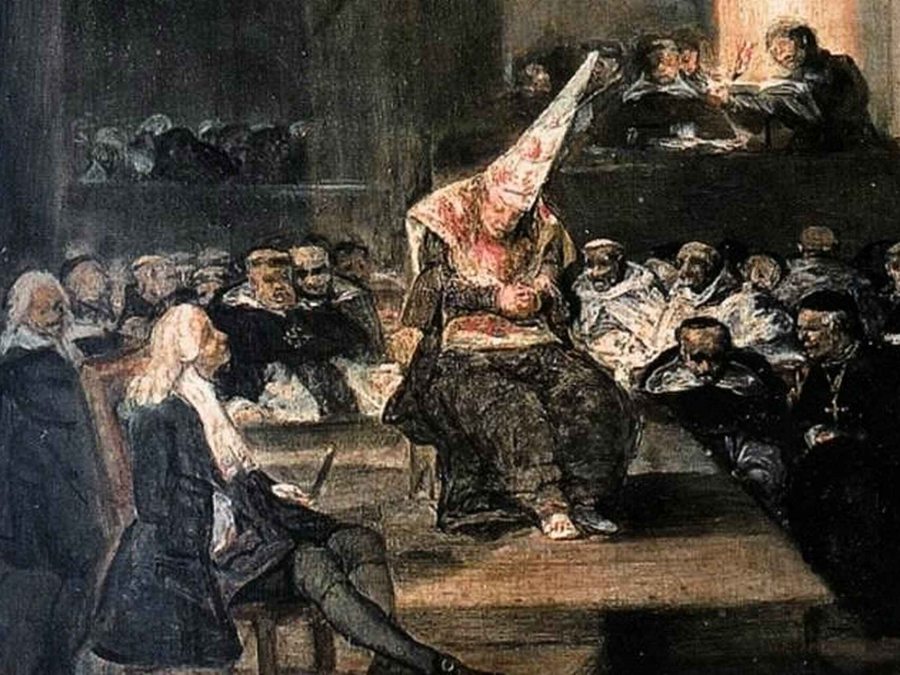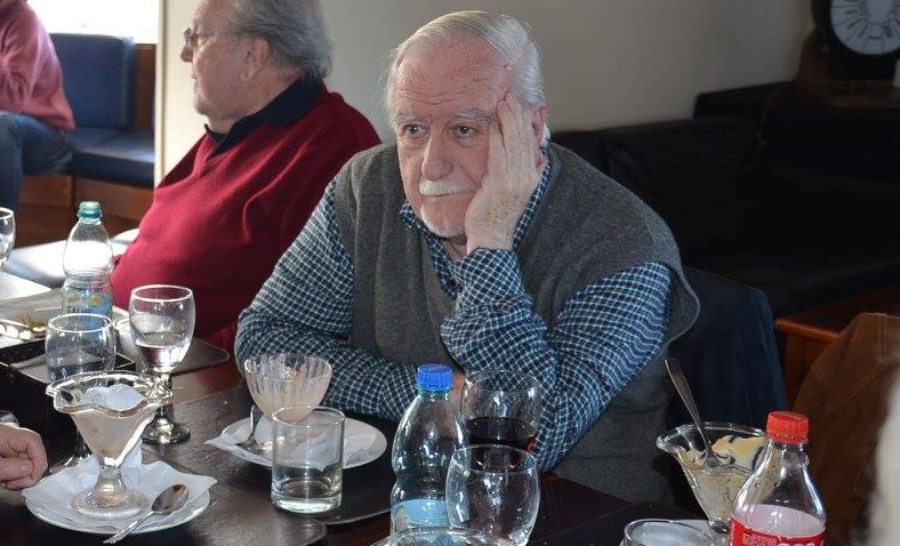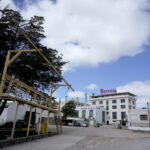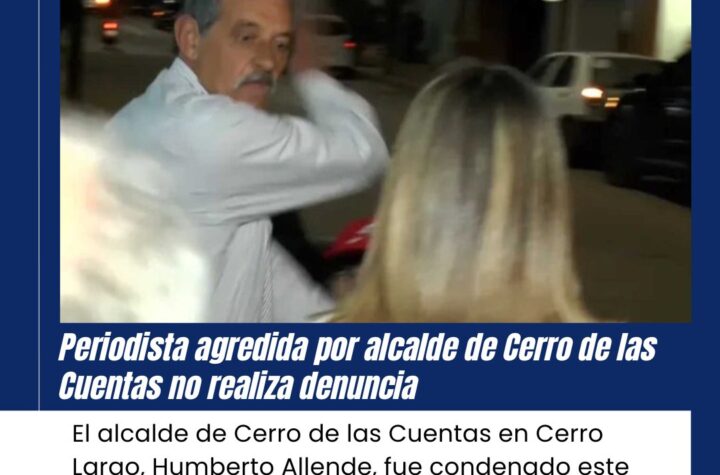

Hay una emoción vieja y querida que ha vuelto a encender su fuego en mi memoria, que es decir mis entrañas.
There is an old and dear emotion that has rekindled its fire in my memory, which is to say my insides.
Siempre se ha dicho que nadie sabe por qué ocurren estos milagros. Pero no es verdad. Yo lo sabía y lo recordé enseguida porque estaba mirando una foto de mi abuela Juanita, la maestra rural.
It has always been said that no one knows why these miracles occur. But it is not true. I knew it and I remembered it immediately because I was looking at a photo of my grandmother Juanita, the rural teacher.
En mis tiempos de escuela, aquellas dulces mujeres de blancas túnicas y zapatillas solían convocar a recitadores de poesía popular para que nosotros, tiernos niños, iniciáramos el camino hacia el mundo de los sentimientos, que no sabíamos definir.
In my school days, those sweet women in white tunics and slippers used to summon reciters of popular poetry so that we, tender children, could begin the path towards the world of feelings, which we did not know how to define.
Entonces puedo decírtelo ahora, Rafael, que he querido darme el gusto de hablar contigo al cabo de tanto tiempo; cierta tarde, un hombre bueno y modesto llamado Miguel de Mozos recitó uno de tus poemas en clase:
So I can tell you now, Rafael, that I wanted to give myself the pleasure of talking to you after so long; One afternoon, a good and modest man named Miguel de Mozos recited one of your poems in class:
–Esta noche de agosto/ he quemado tus cartas…/ ¡Ocho años de vida apasionada! Mi corazón ardía/ en medio de las llamas, rodeado de fechas,/ ¡cenizas de mi alma!
-This August night/ I have burned your letters…/ Eight years of passionate life! My heart burned / in the middle of the flames, surrounded by dates, / ashes of my soul!
Ah, querido hermano Rafael, tan delicado, tan elegante, tan enamoradizo, nacido en cuna sevillana aristocrática, amante de cafés y teatrillos de poetas, gitanos de guitarra y bailarinas: la libertad republicana te permitió esa bohemia, fuiste amigo de García Lorca, de León Felipe, de Machado y creaste más versos que cualquier otro soldado lírico de la Generación del 27.
Ah, dear brother Rafael, so delicate, so elegant, so in love, born in an aristocratic Sevillian cradle, lover of cafes and theaters of poets, guitar-playing gypsies and dancers: republican freedom allowed you that bohemia, you were a friend of García Lorca, of León Felipe, by Machado and you created more verses than any other lyrical soldier of the Generation of ’27.
-Sí… ¡pero también me llevó a la cárcel y me negaron los críticos y las antologías de mi época y las que vinieron!
-Yes… but it also took me to jail and I was denied by critics and anthologies of my time and those that came!
¿Ves? Hay milagros pese a quien pese: he sentido tronar tu voz, ardiendo en el enojo. Jamás sabré de donde viene, pero sé que eres tú y que aun te lastima el desprecio con que te insultaron algunos. ¡A ti, Rafael, que además de tus poesías que surcaron el mundo hiciste canciones populares como Tatuaje, Ojos verdes, A ciegas, A la lima y al limón, ¡Ay, pena, penita, pena!, María de la O y Cárcel de oro, con las que ensoñaron a hombres y mujeres durante décadas Carmen Sevilla, Isabel Pantoja, Rocío Jurado, Nino Bravo o Raphael.
You see? There are miracles regardless: I have heard your voice thunder, burning with anger. I will never know where it comes from, but I know that it is you and that the contempt with which some insulted you still hurts you. To you, Rafael, who in addition to your poems that crossed the world made popular songs like Tatuaje, Ojos Verdes, A Blind, A la Lima y al Lemon, ¡Ay, pena, penita, pena!, María de la O and Cárcel of gold, with which men and women dreamed for decades of Carmen Sevilla, Isabel Pantoja, Rocío Jurado, Nino Bravo and Raphael.
–Los abrazos crujían,/ los besos se quejaban,/ y los dulces “te quiero!”/ de tinta y esperanza,/ en una pirueta/ de fuego se rizaban.
-The hugs crunched,/ the kisses complained,/ and the sweet “I love you!”/ of ink and hope,/ in a pirouette/ of fire they curled.
Sin verte, siento de pronto tu mirada melancólica. Y me dices: -¿Quizás no me respetaron, aunque mis poemas y canciones se hayan difundido más que cualesquiera, por mis títulos nobiliarios, un seno familiar que no elegí, o porque fui andaluz hasta la médula, romántico y gracioso, apreciado por los simples? Mira, hombre, si hasta me han llamado “folclorista español… ¡Qué desparpajo, que falta de consideración!
Without seeing you, I suddenly feel your melancholic gaze. And you tell me: – Maybe they didn’t respect me, even though my poems and songs have spread more than any other, because of my titles of nobility, a family that I didn’t choose, or because I was Andalusian to the core, romantic and funny, appreciated by the people. simple? Look, man, they have even called me a “Spanish folklorist… What audacity, what a lack of consideration!
No puedo sanar tanta furia, Rafael. Sin embargo…, acaso me encantaría ver vagar tu alma por ahí, para que advirtieras cuánto, tal vez sin saber de ti, ha querido y quiere la gente los cientos de pájaros de luz que liberaste al vuelo.
I can’t heal so much fury, Rafael. However…, perhaps I would love to see your soul wander around, so that you would notice how much, perhaps without knowing about you, people have loved and love the hundreds of birds of light that you released into flight.
–Como una serpentina,/ tu nombre se alargaba,/ y era un puente la firma/ sobre un río de brasas/ que, silenciosamente, sin voz,/ se desplomaba.
-Like a serpentine,/ your name lengthened,/ and the signature was a bridge/ over a river of embers/ that, silently, without a voice,/ collapsed.
Presta atención, Rafael: aquí tengo un ejemplar de tu primer libro de poesía, Pena y alegría del amor, de 1941; y otros –Jardín de papel y Amor de cuando en cuando– que publicaste dos años después y que cambiaron mi vida.
Pay attention, Rafael: here I have a copy of your first book of poetry, Sorrow and Joy of Love, from 1941; and others –Jardín de papel and Amor from time to time– that you published two years later and that changed my life.
Quité la mirada de la foto de mi abuela, que ya no estaba mirando, y entré a un rincón de sombras como caricias. Nada veía, pero retornó tu voz: -¿Es que crees de verdad que no he pasado en vano?
I took my eyes off the photo of my grandmother, who was no longer looking, and entered a corner of shadows like caresses. I saw nothing, but your voice returned: -Do you really believe that I have not passed in vain?
Mi admirado Rafael… ¿quién soy yo, peregrino pobre que deambula por las letras, para decirlo? Sólo sé que te quiero desde que memoricé tu primer verso. Entre dos soledades –la tuya al escribir, la mía al leer- quedó urdida una entrañable complicidad de la que solo sabemos hoy.
My admired Rafael… who am I, poor pilgrim who wanders through letters, to say it? I only know that I love you since I memorized your first verse. Between two solitudes – yours when writing, mine when reading – an endearing complicity was woven that we only know about today.
¿Qué más pedir?
What more to ask for?
Ahora, porque te imagino caminar hacia la despedida, puedes decir lo que quieras. Yo entenderé.
Now, because I imagine you walking towards goodbye, you can say whatever you want. I will understand.
–Esta noche de agosto/ he quemado tus cartas…/ ¡Ocho años de vida apasionada!
-This August night/ I have burned your letters…/ Eight years of passionate life!
AUTO DE FE (·) es el título de un conocido poema de Rafael de León, nacido en Sevilla en 1908 y muerto en Madrid en 1982, considerado el más grande poeta popular español, cuya celebridad se empinó, gracias a los humildes y a los sensibles, sobre el talante épico de sus compañeros de la Generación del 27. En su homenaje, esté donde esté.
AUTO DE FE (·) is the title of a well-known poem by Rafael de León, born in Seville in 1908 and died in Madrid in 1982, considered the greatest Spanish popular poet, whose fame increased, thanks to the humble and the sensitive. , about the epic spirit of his colleagues from the Generation of ’27. In his tribute, wherever he is.















More Stories
PODCAST: DeMENTES. “Hay que hacer lo que ellos dicen…”, o sea, llevados de la nariz por la “ciencia”
PODCAST. DeMENTES en radio un programa ideal para analizar el Nuevo Desorden Mundial
Antonio Pippo: La Imaginación del Letrista